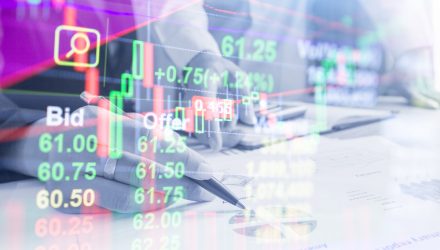Investors are often biased towards equities in their home countries, and U.S. investors are guilty of this, too. However, U.S. investors can rationalize that approach because the S&P 500 and other broad, domestic equity benchmarks easily outpaced international rivals over the past decade.
Still, there’s a case for international equities, particularly those of the ex-U.S. developer markets variety. Scores of exchange traded funds provide that exposure, including the WisdomTree International Equity Fund (NSYEArca: DWM).
DWM follows the WisdomTree International Equity Index, which is a basket of developed market equities, excluding the U.S. and Canada. That index is “comprised of companies incorporated in 15 developed European countries, Japan, Australia, Hong Kong, Israel and Singapore,” according to WisdomTree.
DWM is a relevant consideration today due to high levels of concentration and elevated valuations in the U.S. along with inflationary pressures here that could make international equities more attractive.
“Investors with a large home bias are not only concentrated geographically, but also may not be nearly as diversified across sectors as they believe and might risk missing their financial goals as longer-term trends shift with the start of a new global economic cycle,” says Jeffrey Kleintop of Charles Schwab.
The case for DWM is boosted when factoring in the fact that the fund’s underlying index focuses on dividend-paying companies and that the index weights those components by annual cash dividends paid. That indicates that DWM is a valid idea for income investors and can potentially offer lower volatility relative to traditional international equity funds.
DWM’s status as a dividend-oriented ETF is relevant for other reasons, including expectations that ex-U.S. developed market payout growth is forecast to climb this year amid currency fluctuations.
“By holding an investment denominated in another currency, an investor will experience both the change in the asset price (in that currency) but also the change in the value of the currency, when measuring a portfolio in dollars,” adds Kleintop. “Since currency valuation can move as much as the stock price, it’s an important factor to consider. The U.S. dollar is the world’s most-used currency, but that doesn’t mean its value is a constant.”
Another reason to consider international equities, beyond compelling valuations and attractive dividends, is that the asset class could be due to outperform U.S. stocks, particularly with the arrival of a new business cycle.
“These changes in leadership result from behavioral as well as fundamental factors. After a full cycle of outperformance, relative valuations and earnings expectations become stretched and begin to reverse with the catalyst of a new cycle. And now, the start of a new cycle may once again signal a switch to international stocks in the years ahead,” concludes Kleintop.
For more news, information, and strategy, visit the Modern Alpha Channel.
The opinions and forecasts expressed herein are solely those of Tom Lydon, and may not actually come to pass. Information on this site should not be used or construed as an offer to sell, a solicitation of an offer to buy, or a recommendation for any product.








